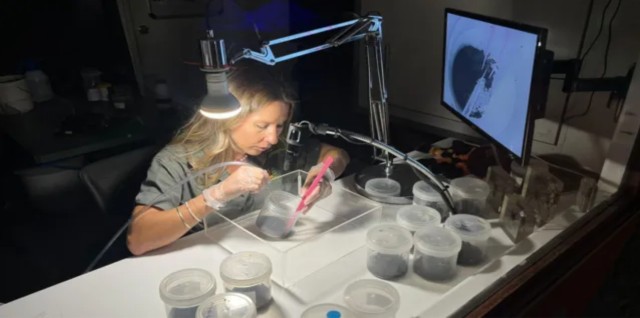
Gypsy Rose Blanchard testifies in the trial of her former boyfriend, Nicholas Godejohn, on November 15, 2018, in Springfield, Missouri. Blanchard, a Missouri resident who confessed to influencing her online boyfriend to murder her abusive mother, having feigned severe illnesses for an extended period, was granted parole and released from prison on Thursday. (Photo by Nathan Papes/The Springfield News-Leader/The Associated Press)
Gypsy Rose Blanchard, the Missouri woman entangled in a chilling case that captivated the nation, was granted parole and released from the Chillicothe Correctional Center on Thursday, as confirmed by Karen Pojmann, spokesperson for the Missouri Department of Corrections. Blanchard, now 32, had served 85% of her original sentence.
The case gained widespread attention due to the shocking revelations surrounding Blanchard's mother, Clauddine Blanchard, who was killed in 2015. Initially, it was believed that Gypsy Rose suffered from various serious illnesses, including leukemia and muscular dystrophy. However, it later emerged that her mother had fabricated these conditions, keeping her daughter confined and portraying her as medically dependent.
Michael Stanfield, Blanchard's trial attorney, shed light on the situation, revealing that the mother suffered from Munchausen syndrome by proxy. This psychological disorder involves caregivers exaggerating or inventing illnesses in those under their care, often to garner sympathy. Stanfield noted that Dee Blanchard, seeking attention and accolades, managed to deceive doctors, manipulate charitable organizations, and even receive donations and gifts.
The abuse escalated, with Gypsy Rose enduring unnecessary medical procedures and physical harm. Stanfield highlighted the isolation Gypsy Rose experienced, shielded from the outside world and misled by the constant affirmation of her mother's supposedly caring nature.
In 2018, during the trial of her then-boyfriend Nicholas Godejohn, who was convicted for the murder, Gypsy Rose testified that she persuaded him to kill her mother, expressing a desire to break free from her control. Godejohn, who is serving a life sentence, was described as being manipulated due to his obsessive love for Blanchard.
Prosecutors argued differing motivations, with some asserting Godejohn's desire for a sexual relationship and others emphasizing the manipulation he faced. Blanchard's guilty plea to second-degree murder in 2016 resulted in a 10-year prison sentence, a significant reduction from the potential life term for first-degree murder.
Stanfield remarked on Blanchard's improved physical condition after serving time in prison, highlighting the severity of her past circumstances. Despite initial confusion regarding her age, Blanchard's true identity and the extent of her mother's deception became evident during the investigation.
Blanchard, who married Ryan Scott Anderson while behind bars, has become a focal point of various media productions, including documentaries and a forthcoming docuseries. Her story has also inspired works of fiction, emphasizing the extraordinary and unusual nature of this case.
In media scrutiny, the Department of Corrections restricted in-person coverage of Blanchard's release to safeguard safety, security, and privacy concerns.















